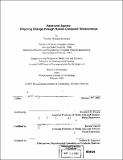Relational agents : effecting change through human-computer relationships
Author(s)
Bickmore, Timothy W
DownloadFull printable version (31.81Mb)
Other Contributors
Massachusetts Institute of Technology. Dept. of Architecture. Program In Media Arts and Sciences
Advisor
Rosalind W. Picard and Justine Cassell.
Terms of use
Metadata
Show full item recordAbstract
What kinds of social relationships can people have with computers? Are there activities that computers can engage in that actively draw people into relationships with them? What are the potential benefits to the people who participate in these human-computer relationships? To address these questions this work introduces a theory of Relational Agents, which are computational artifacts designed to build and maintain long-term, social-emotional relationships with their users. These can be purely software humanoid animated agents--as developed in this work--but they can also be non-humanoid or embodied in various physical forms, from robots, to pets, to jewelry, clothing, hand-helds, and other interactive devices. Central to the notion of relationship is that it is a persistent construct, spanning multiple interactions; thus, Relational Agents are explicitly designed to remember past history and manage future expectations in their interactions with users. Finally, relationships are fundamentally social and emotional, and detailed knowledge of human social psychology--with a particular emphasis on the role of affect--must be incorporated into these agents if they are to effectively leverage the mechanisms of human social cognition in order to build relationships in the most natural manner possible. People build relationships primarily through the use of language, and primarily within the context of face-to-face conversation. Embodied Conversational Agents--anthropomorphic computer characters that emulate the experience of face-to-face conversation--thus provide the substrate for this work, and so the relational activities provided by the theory will primarily be specific types of verbal and nonverbal conversational behaviors used by people to negotiate and maintain relationships. (cont.) This work also provides an analysis of the types of applications in which having a human-computer relationship is advantageous to the human participant. In addition to applications in which the relationship is an end in itself (e.g., in entertainment systems), human-computer relationships are important in tasks in which the human is attempting to undergo some change in behavior or cognitive or emotional state. One such application is explored here: a system for assisting the user through a month-long health behavior change program in the area of exercise adoption. This application involves the research, design and implementation of relational agents as well as empirical evaluation of their ability to build relationships and effect change over a series of interactions with users.
Description
Thesis (Ph. D.)--Massachusetts Institute of Technology, School of Architecture and Planning, Program in Media Arts and Sciences, 2003. Includes bibliographical references (p. 205-219).
Date issued
2003Department
Program in Media Arts and Sciences (Massachusetts Institute of Technology)Publisher
Massachusetts Institute of Technology
Keywords
Architecture. Program In Media Arts and Sciences